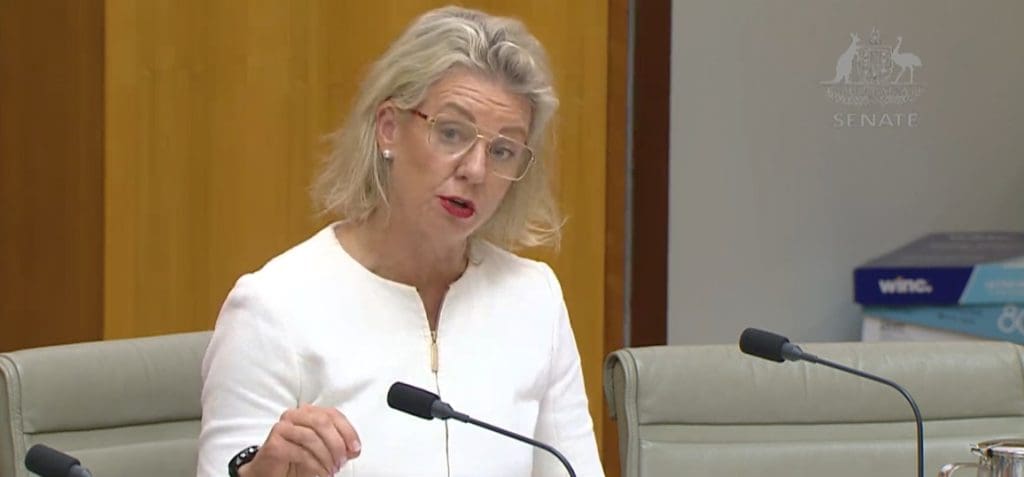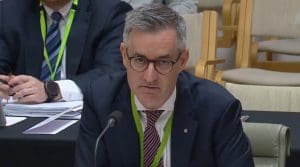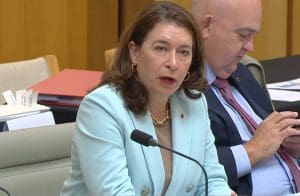
Victorian Nationals Senator Bridget McKenzie queried daylight-only cattle vessel inspections in Senate Estimates yesterday.
DAYLIGHT-ONLY biosecurity inspections at northern Australian ports have cost live cattle exporters up to A$26,000 per shipment in extra costs and lost revenue, Nationals Senator Bridget McKenzie told Senate Estimates yesterday.
Senator McKenzie told a hearing of the Rural and Regional and Transport Legislation Committee the losses were being incurred because of the Department of Agriculture, Fisheries and Forestry’s decision to only do vessel biosecurity inspections in daylight hours.
Senator McKenzie sought a commitment from DAFF secretary Adam Fennessy to review the daylight-only inspection measures if the exporters’ costs and profit loss estimates were correct.
Her representations follow a letter to Mr Fennessy from the Australian Livestock Exporters’ Council last November outlining the challenge exporters faced in accessing DAFF biosecurity inspection services for vessels at the Port of Darwin and other northern ports such as Broome outside of daylight hours.
ALEC said until recently the DAFF biosecurity inspections were available at all hours to support the prompt and cost-effective loading and shipping of cattle.
“However, this has not been the case for the last 12 months now, since Darwin came under national operations, and it has caused considerable commercial disruption,” ALEC chairman David Galvin said in the letter.
Senator McKenzie said the industry wanted to know why at a 24-hour export facility like a port Mr Fennessy had made a decision that biosecurity staff only work in daylight hours.
Mr Fennessy initially refused to directly address the question, saying that the long-term approach of Australian Border Force and DAFF is to do pre-clearances for incoming imports and pre-clearance for outgoing
“So that allows us to provide those services in a way that is not related to a 12 or 24-hour cycle.”
Mr Fennessy said he would get biosecurity staff to answer the query and he did not take operational decisions, but understood the impact on agricultural industry profitability and productivity of his staff’s decisions.
“The overall approach to biosecurity is risk-based, so it will depend on the cost and benefit.
“It will depend on the best allocation of our resources, which is something that is worked through our operations team in biosecurity,” he said.
Mr Fennessy said he and the deputy secretary of biosecurity have convened a Sustainable Biosecurity Advisory Panel that met directly with exporters and exporters. However, neither the secretary nor assistant Minister for Agriculture Anthony Chisholm would answer whether biosecurity risks at a 24-hour port only occurred during the day.
After a brief suspension following an exchange between Senator McKenzie and Mr Chisholm over biosecurity funding, Mr Fennessy said he could speak to the broader workplace health and safety issues.
“My understanding is under our enterprise agreements safe work places will relate to the occupational conditions of work.
“At some ports that includes daylight hours for unloading of vessels and inspection, so that is relevant,” he said.
Senator McKenzie said the level of frustration is high at the ports because additional costs are being occurred in loading and waiting for biosecurity clearances if the vessel arrives after 3pm.
She said this can increase the holding time for a vessel, meaning additional charges for a standard cattle shipment in the north of USD$20,000/day. Exporters are reporting experiencing delays in up to 70 percent of their shipments meaning potentially tens of thousands of cattle per year are not being exported because of the daylight-only inspection decision, Senator McKenzie said.
Senator McKenzie said the government was shutting down the live sheep trade and now the cattle trade is having significant impacts on their profitability and sustainability
“Simply because you’ve only got your biosecurity officers operating through daylight hours.”
DAFF officer Tim Simpson said his understanding was the issue was more about the ability for light to be there to undertake vessel inspections.
“They want sufficient light so they can the potential biosecurity risks and hazards at those locations.
“So it is a long-standing principle at all our locations if the light isn’t there to undertake those,” he said.
“So if we have the people if we have the lamps,” Senator McKenzie said.
“I believe so, yes, if we have the light the workforce would need to be potentially recruited because it may move into shift arrangements and the funding issues obviously and the parameters, but it’s about the WHS and the ability to undertake those inspections at the moment in those locations outside of daylight hours.”

DAFF secretary Adam Fennessy: Has to comply with work health and safety outcomes.
Mr Fennessy agreed that he wouldn’t want these negative impacts on agriculture.
“Yes, that is correct and at the same time I have to comply with work health and safety outcomes and then the risk-based approach to funding biosecurity services.
“So that’s the range of factors we take into account.”
Mr Fennessy said he would recommit “that every dollar spent on biosecurity funding we make transparent through that new sustainable and advisory funding panel.”
Senator McKenzie said the government’s decision to phase out live sheep exports and this daylight inspection decision and his commitment to discuss it at a panel made it hard for cattle exporters to feel supported.
Assistant Agriculture Minister Chisholm said Minister for Agriculture, Fisheries and Forestry Julie Collins was in Darwin last week and engaged with cattle farmers and reiterated her strong support for the live export trade.
A generator and some lights might solve the problem

Senator Susan McDonald – a generator and some lights might solve the problem.
Senator Susan McDonald asked Mr Fennessy whether his staff has considered the animal welfare impacts of leaving animals in yards longer than necessary and exposing the cattle industry workforce to having to feed and work outside daylight hours.
He said animal welfare is regulated through the Exporters Supply Chain Assurance System.
“If you are only considering work place health and safety, then surely a generator and some lights would solve the problem,” Senator McDonald said.
Mr Fennessy said the department is considering a range of factors, “including cost benefit, value of market and animal welfare and work health and safety.”
ALEC chief executive officer Mark Harvey-Sutton said biosecurity clearances were needed before vessels could be loaded.
“What used to happen is that different ports came under operational areas (in DAFF), but when these northern ports came under (DAFF) national operations the workplace agreements that was in place for that part of the department restricted work to just daylight hours.”
Mr Harvey-Sutton said he understands DAFF sees biosecurity inspections outside of daylight hours as a workplace safety issue.
“But prior to these ports coming under national operations, these inspections occurred with no issue whatsoever at any time.
”It’s not because biosecurity staff aren’t working during the 24 hours a day, many of them are at Darwin airport working on international flights that take place in the middle of the night,” he said.
“So it’s not an issue of whether they are available, it’s the fact that inspections might need to take place outside daylight hours.”
Mr Harvey-Sutton said the northern ports are very tidal and if vessels did not come in certain times they could lose a day in the shipping schedule.
“That starts to impact congestion and you’ve got your demurrage charges.
“It adds quite a lot of cost.”
Mr Harvey-Sutton said ALEC is awaiting for a response from DAFF about how the issue can be managed.
“We are hopeful that there is a practical way forward working with the department here.”

HAVE YOUR SAY